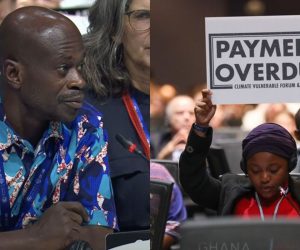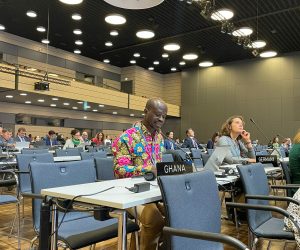CVF Chair Statement at Informal Stocktaking Plenary by the COP26 President

CVF Chair Statement at Informal Stocktaking Plenary by the COP26 President
Statement by H.E. Mr. Saber Chowdhury, MP, Honorary IPU President and Chair, Bangladesh Parliamentary Committee on the Environment, Forest, and Climate Change
12 November 2021
Watch the full statement on the UNFCCC webcast (Timestamp: 1:51:00)
Thank you, Mr. President. As part of the LDC, we are of course fully aligned with the views that have been expressed and let us begin by adding our words of appreciation for your leadership and stewardship – and the fact that we are where we are today, I think speaks volumes of the work that you and your team have done. Bangladesh has supported and we will continue to support your efforts.
Mr. President, as you are aware, Bangladesh also holds the current Presidency of the Climate Vulnerable Forum, in addition to our LDC affiliation. The first point I would like to make – and you will be pleased to know, Mr. President, that it will not be a long speech since I don’t have it written down. I will just share with you a few points.
The first point that I would like to make is: how are we going to look back at COP26 and what are we actually going to refer to it by? What will it be called? This is a very unique COP because the science has never been clearer, it has never been more conclusive, the devastation and the loss that has been caused has not been any severe in the past. There is an emergency prevailing all over the world. Various parliaments have declared a climate emergency. The Bangladesh Parliament declared a planetary emergency. And so, we think that it would be very appropriate if we called all of the decisions coming out of Glasgow as the “Glasgow Emergency Pact” because that would describe the current state of the climate crisis and also we, as a global community, what we are trying to do to respond to it. That would be the first suggestion.
The second suggestion, Mr. President, would be – there is a huge disconnect between where we are, where we will be, based on current projections, and where we need to be, in terms of what science is telling us. Ambition cannot end with COP26. Ambition has to be a recurring event in future COPs. What can we do to in fact make sure that the ambition agenda continues on to future COPs? I think that also is a very important point for us to know. And when we talk about ambition or even annual ambition raising, we are not just referring to mitigation. We are referring to adaptation, finance, technology transfer, loss and damage. I think ambition as a central theme across the board is very important for future COPs because we need to do that if we are going to be where we need to be and where science is saying that we have to be.
Also, the other point that we would like to bring to the attention of the Parties through you, Mr. President, is that we are rightly talking about 1.5 – when I say rightly, in terms of: this is going to avoid the worst impacts of climate change. It doesn’t mean that it gives us a comfort zone and life is going to be back to normal without any of the impacts. Even at 1.1, we see the destruction, the devastation, the pain, the suffering that all countries of the world are facing – whether it is droughts, flooding, wildfires. We all see the impacts. In our own country, Bangladesh, we have literally hundreds and thousands of people who are being displaced by climate threats in all parts of the country. We are having the melting of the glaciers in the Himalayas. We really need to think – not just in terms of trying to reestablish 1.4 or calibrate 1.5 as a target. We have to think about what will be the implemental impacts as we move from 1.1 to 1.5, as we surely will. And that in itself provides a rational for us to be talking about additional funding support, additional adaptation needs, additional impacts on account of loss and damage. I think the two are related. This is certainly not a silver bullet and not an ideal position to be in, when we talk about 1.5. We also think that it is important to flag that.
Some very quick specifics on the language. On para 27, the language on transparency needs to be strengthened. We suggest, or we recommend, that the Secretariat should do an annual report on implementation of the finance delivery plan. This is very important, and it comes back to a fundamental point: what are we trying to agree on? We are not just trying to agree on text, not just on words. We also have to make sure that we deliver on those pledges. Unless we deliver – and these pledges are always going to be as good as the actual delivery. How do we have in place a robust mechanism that allows us to monitor and ensure that the delivery takes place? That is very important.
In the CMA text, paras 30 and 31, we suggest that they should be moved to science and urgency rather than being trapped just in mitigation, and they should not just be mitigation, but it should also be adaptation and finance, where possible. As for instance, in the current 1CMA para 31, we should not restrict the meetings and the coming together to ministers. I think we should allow for leaders and heads of government also to come into play. That flexibility should be there for us. Para 31, roundtables should not be open ended, but it should run until 2025 or at the latest 2027 so that we can keep the focus on short ambition raising which is absolutely critical.
Mr. President, I will leave you with two thoughts. First, what are we negotiating here? Are we just negotiating an agreement or are we negotiating what is actually non-negotiable? We are negotiating about our future. We are negotiating our very existence. We call climate change an existential threat. That should not be negotiable. But yet we are spending time and effort to negotiate that particular aspect. And why are we negotiating? Is it just to keep the UNFCCC process functioning? It is just to keep the heart of UNFCCC ticking away or is it to deliver real change which science demands and which the future generation is always going to hold us accountable to?
Thank you, Mr. President.




